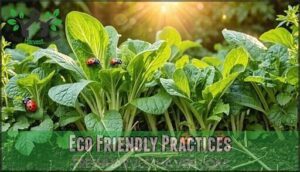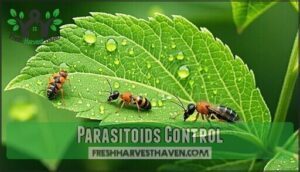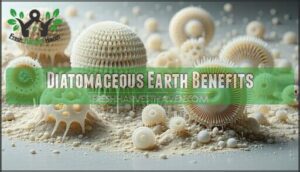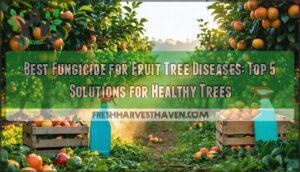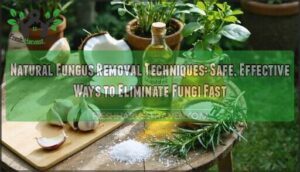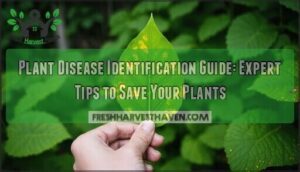This site is supported by our readers. We may earn a commission, at no cost to you, if you purchase through links.
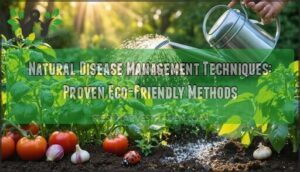
Start with compost tea – it’s like a vitamin boost for your soil. Neem oil acts as nature’s pest deterrent, while companion planting creates helpful partnerships between crops.
Crop rotation breaks disease cycles, and beneficial insects become your garden’s security team. Diatomaceous earth works like microscopic glass against soft-bodied pests.
Essential oils from garlic and peppermint confuse harmful insects. These methods aren’t just trendy – they’re time-tested strategies that build stronger, healthier plants from the ground up.
The secret lies in combining several approaches for maximum protection.
Table Of Contents
- Key Takeaways
- Natural Disease Prevention
- Eco Friendly Practices
- Biological Control Methods
- Chemical Free Alternatives
- Integrated Pest Management
- Frequently Asked Questions (FAQs)
- How do you manage plant diseases naturally?
- What are organic and natural pest and disease control methods?
- What are the different methods of plant disease management?
- What are the key practices for preventing disease?
- What makes a successful disease management system?
- What are natural remedies for garden pests & diseases?
- What are the techniques of disease management?
- What is a natural pest control method?
- What are disease management strategies?
- What are the six principles of disease management?
- Conclusion
Key Takeaways
- You’ll build stronger plant immunity by combining multiple natural methods like compost tea, neem oil, and beneficial insects rather than relying on a single approach – this creates a self-sustaining defense system that outperforms harsh chemicals.
- You can prevent most plant diseases before they start by focusing on soil health through proper testing, organic amendments, and crop rotation – healthy soil creates plants so strong that diseases simply can’t establish themselves.
- You’ll maximize pest control effectiveness by attracting beneficial insects through companion planting and habitat creation – these natural predators work around the clock to eliminate harmful pests without damaging your garden ecosystem.
- You should implement integrated pest management by starting with the gentlest methods first, like proper sanitation and plant spacing, then escalating only when necessary – this sustainable approach protects both your plants and the environment long-term.
Natural Disease Prevention
You’ll find that preventing diseases naturally works better than fighting them after they’ve already taken hold of your plants.
By focusing on healthy soil, smart plant choices, and organic treatments, you can create a garden that naturally resists most common plant diseases.
Organic Treatment Methods
Organic treatment methods are your garden’s first line of defense against diseases, working like a natural pharmacy that strengthens plants from the inside out.
These natural disease management techniques build resilience while protecting the environment you’re cultivating.
Here are five proven organic treatment methods that’ll transform your garden’s health:
- Compost Tea – Brew this liquid gold to flood your soil with beneficial microorganisms that outcompete harmful pathogens
- Herbal Remedies – Use garlic, chamomile, and other plant extracts to create powerful disease-fighting sprays
- Milk Sprays – Mix diluted milk to combat powdery mildew and other fungal infections naturally
- Baking Soda solutions – Apply weekly to prevent disease outbreaks without harsh chemicals
- Biofungicides – Introduce beneficial bacteria that protect plants while improving soil health
These organic amendments work together, creating a self-sustaining ecosystem where natural remedies keep diseases at bay.
Beneficial Insects Role
The tiny warriors in your garden work around the clock to keep pests in check. Beneficial insects form the backbone of integrated pest management (IPM), offering natural biological control that protects your soil ecosystem while supporting biodiversity.
Three main groups handle pest duty: predators hunt down troublemakers, parasitoids lay eggs inside host pests for long-term control, and pollinators keep your garden thriving. These pest predators maintain garden ecosystem balance without harsh chemicals.
To further enhance your garden’s defenses, consider employing companion planting methods for mutual benefits.
Here’s your garden defense lineup:
Guardian Specialty Pest Control Benefit
Focus on habitat creation through pollinator protection. Plant flowers, provide shelter, and avoid pesticides to support these natural allies.
Companion Planting Benefits
Smart gardeners know that companion planting creates powerful plant partnerships that naturally fight disease while boosting garden health.
When you strategically place compatible plants together, you’re basically building a living defense system that confuses pests, cycles nutrients efficiently, and attracts beneficial pollinators.
These interplanting techniques work by maximizing plant diversity and creating a biodiversity boost that strengthens your entire garden ecosystem.
You’ll see yield improvement as plants support each other’s growth and health.
Here are five proven companion combinations that deliver results:
- Marigolds with tomatoes – repel nematodes while improving soil fertility
- Basil near peppers – enhances flavor and deters harmful insects
- Nasturtiums around cucumbers – trap crop for aphids and beetles
- Garlic between roses – natural fungicide properties protect blooms
- Mint with brassicas – confuses cabbage moths through pest confusion
Combined with crop rotation, these partnerships create sustainable nutrient cycling that keeps your garden thriving naturally.
Eco Friendly Practices
You can protect your plants and soil by using eco-friendly practices that work with nature instead of against it.
These methods include proper soil management, smart crop rotation, and mulching techniques that create healthier growing conditions while reducing your need for chemical treatments.
Soil Fertility Management
Building on disease prevention, your soil’s health determines your plants’ natural immunity against pathogens.
Strong soil builds plants that naturally resist disease—your garden’s foundation determines everything that grows above it.
Soil testing reveals exactly what nutrients you’re missing, preventing costly guesswork.
Quality compost tea feeds beneficial microbes that crowd out harmful organisms naturally. Cover crops between seasons add organic matter while fixing nitrogen—like getting free fertilizer. Natural fertilizers such as bone meal and kelp meal provide targeted nutrition without synthetic chemicals.
Organic amendments improve soil structure and water retention.
Think of soil fertility management as building your garden’s immune system. Healthy soil creates plants so strong that diseases simply can’t establish themselves.
Crop Rotation Techniques
Why stick with the same plants year after year when crop rotation offers incredible rotation benefits? This time-tested technique transforms your garden into a self-sustaining ecosystem.
You’ll disrupt pest lifecycles naturally while boosting soil health through strategic nutrient cycling. Different plant families contribute unique benefits to your soil.
Legumes fix nitrogen, while heavy feeders like tomatoes consume it. This natural exchange prevents nutrient depletion and reduces disease pressure.
Crop rotation also provides excellent weed suppression by alternating deep-rooted and shallow-rooted plants. Your organic gardening efforts become more effective when you rotate crops seasonally.
This plant disease management strategy creates healthier soil microbiomes. To further enhance soil structure, consider amending soil properly.
These sustainable practices work like a reset button for your garden, breaking pathogen cycles while maintaining soil fertility naturally.
Mulching Benefits
Every garden deserves a protective blanket, and mulch delivers exactly that defense your plants crave.
This organic gardening powerhouse transforms your soil health while boosting disease prevention naturally. You’ll discover mulching benefits extend far beyond simple ground cover—they create a living ecosystem that supports robust plant health.
When you spread organic matter around your plants, you’re investing in:
- Moisture Retention: Cuts water loss by 70%, maintaining consistent hydration for stronger root systems
- Weed Suppression: Blocks sunlight from reaching weed seeds, eliminating competition for nutrients
- Soil Temperature: Keeps roots comfortable between 65-75°F, preventing stress-related diseases
- Erosion Control: Shields soil from heavy rainfall, preserving valuable topsoil and nutrients
Different materials work best for specific situations. Straw excels for vegetable gardens, while wood chips suit perennial beds perfectly. Consider using quality organic options for best results.
Biological Control Methods
You can harness nature’s own pest control team by introducing beneficial microorganisms and parasitoids that target harmful pests without damaging your plants or soil.
These biological warriors work around the clock, competing with disease-causing organisms for resources while boosting your plants’ natural defenses against common garden threats, acting as a form of biological control.
Microbial Agents Role
Your garden’s soil teems with microscopic defenders working around the clock to protect your plants.
These microbial agents act like a natural security system, fighting off harmful pathogens before they can damage your crops.
Here’s how beneficial microorganisms create your garden’s defense network:
- Bacterial agents release antimicrobial compounds that directly attack disease-causing organisms
- Fungal control species outcompete harmful fungi by claiming nutrients and growing space first
- Soil microbes strengthen plant immunity by triggering your plants’ built-in defense systems
- Microbial biopesticides target specific pests while leaving helpful insects unharmed
- Biological control organisms transform ordinary dirt into suppressive soils that naturally resist disease
These soil immunity boosters work together, creating an underground army that’s invisible to you but deadly to plant pathogens.
Some of these agents employ induced systemic resistance to protect plants.
When you encourage these natural allies, you’re building a self-sustaining ecosystem that protects your garden without synthetic chemicals.
Parasitoids Control
While chemicals might seem like the quick fix, parasitoids offer a smarter, longer-lasting solution for your garden’s pest problems.
These tiny biological control agents work like nature’s precision strike team, targeting specific pests through their unique lifecycle targeting approach.
Unlike broad-spectrum pesticides, parasitoid species demonstrate remarkable host specificity, attacking only their intended targets while leaving beneficial insects unharmed.
One method to protect young plants is early row cover installation.
You’ll maximize natural pest control effectiveness through augmentation strategies—releasing purchased parasitoids when pest populations spike.
Conservation biocontrol works differently, focusing on creating habitat that supports existing parasitoid populations.
This integrated pest management approach builds sustainable biological control systems that protect your garden season after season, using biological control agents and promoting a smarter solution for garden pest problems.
Chemical Free Alternatives
You don’t need harsh chemicals to protect your plants from pests and diseases when nature provides powerful alternatives.
These proven methods use natural oils, mineral powders, and plant extracts that work just as well as synthetic products while keeping your garden safe for beneficial insects and your family.
They are powerful alternatives to synthetic products.
Neem Oil Uses
Beyond biological controls, neem oil serves as nature’s Swiss Army knife for your garden. This tree-derived extract contains the powerful azadirachtin compound that disrupts pest life cycles while remaining gentle on beneficial insects.
Your neem oil dilution should follow a simple 2:1000 ratio – two teaspoons per quart of water with a drop of mild soap. Application frequency matters: spray every 7-14 days for active infestations, then monthly for prevention.
For specialized needs, consider exploring different product options here.
Neem oil uses include:
- Pest specificity – targets aphids, spider mites, and whiteflies without harming ladybugs
- Natural disease management techniques – prevents powdery mildew and black spot on roses
- Organic pest management – acts as both insecticide and fungicide in one treatment
Watch for plant sensitivity on delicate seedlings. Apply during cooler hours to prevent leaf burn. While neem resistance is rare, rotate with other treatments for maximum effectiveness.
Diatomaceous Earth Benefits
While neem oil targets pests through biochemical disruption, diatomaceous earth takes a different approach—it’s a physical warrior that cuts through pest exoskeletons like microscopic glass.
This food grade powder delivers reliable organic treatments without chemical residues. To purchase, consider these options for quality products.
Here’s how different application methods work:
| Method | Target Area | Coverage Duration |
|---|---|---|
| Dry dusting | Plant surfaces | 7-14 days |
| Soil mixing | Root zone | Season-long |
| Barrier rings | Plant base | Until rain |
| Spray mixture | Broad coverage | 3-5 days |
| Storage containers | Stored goods | Months |
Safety precautions matter—always use food-grade DE and avoid inhaling dust. Effectiveness duration depends on moisture, but this natural disease management technique keeps working as long as it stays dry.
Essential Oils Effects
While diatomaceous earth provides mechanical pest control, essential oils pack a chemical punch that’ll make your garden’s problems disappear like magic.
These concentrated plant extracts bring serious antimicrobial properties to your gardening toolkit without synthetic chemicals.
Your plants benefit from nature’s pharmacy through targeted cellular responses:
- Tea tree oil boosts plant immunity while fighting harmful microorganisms
- Thyme and cinnamon oils deliver powerful antioxidant benefits that prevent cellular damage
- Citrus-based oils reduce inflammation and create hostile environments for pathogens
- Rosemary extract triggers protective responses against oxidative stress
- Eucalyptus oil inhibits bacterial growth when properly diluted.
Smart oil combinations amplify these antifungal properties.
Mix 15 drops with water in a spray bottle for effective application methods. Apply during morning or evening hours to prevent leaf burn.
These natural remedies work alongside your plants’ defense systems, creating healthier gardens through proven essential oils effects. You’re basically giving your plants their own bodyguard service.
Integrated Pest Management
You’ll find that integrated pest management combines multiple eco-friendly strategies to control pests while protecting beneficial insects and soil health.
This smart approach starts with the gentlest methods first, like companion planting and sanitation practices, then escalates only when necessary to keep your garden thriving naturally.
Holistic Approach Benefits
You’ve explored individual natural methods, but combining them creates something much more powerful.
A holistic approach to natural disease management works like building a strong fortress—each layer adds protection. This strategy strengthens your garden’s natural defenses while promoting ecosystem balance and resilience building.
sustainable control
This integrative medicine for gardens guarantees reduced reliance on harsh treatments while supporting holistic health and long-term health.
Sanitation Practices Importance
Think of garden sanitation like keeping your kitchen clean—it prevents problems before they start. While holistic approaches create strong plant communities, maintaining spotless garden hygiene forms your first line of defense against disease outbreaks.
Effective sanitation practices aren’t complicated, but they’re incredibly powerful. You’re basically removing the welcome mat for harmful pathogens that love to crash your garden party.
Here’s your pathogen prevention checklist:
- Tool sanitation: Disinfect pruners and shovels with rubbing alcohol between plants
- Debris removal: Clear fallen leaves, dead stems, and rotting fruit immediately
- Plant quarantine: Keep new additions separate for two weeks before planting
- Site hygiene: Maintain clean walkways and remove weeds that harbor diseases
- Garden cleanliness: Wash hands and boots when moving between garden areas
These garden sanitation habits create an environment where diseases struggle to take hold. You’ll spend less time fighting problems and more time enjoying healthy plants that thrive naturally. Using neem oil solutions can also prevent many common diseases.
Interplanting Techniques Role
Smart gardeners know that diversity creates strength. Interplanting techniques transform your garden into a natural fortress against pests and diseases. Intercropping creates pest confusion – when you mix tomatoes with basil, hornworms can’t locate their target easily. This polyculture approach delivers a biodiversity boost that strengthens plant immunity.
Resource competition works in your favor as different root systems access various soil nutrients. Taller plants create microclimate creation for shade-loving companions below. These relationships between plants improve resource utilization while delivering impressive yield improvement.
Your garden becomes a balanced ecosystem where beneficial insects thrive, naturally controlling problems before they escalate.
Frequently Asked Questions (FAQs)
How do you manage plant diseases naturally?
You’ll prevent plant diseases by strengthening soil with compost tea, applying neem oil treatments, and using milk or baking soda sprays.
Focus on proper spacing, good drainage, and regular monitoring for early intervention success.
What are organic and natural pest and disease control methods?
Nature’s arsenal holds powerful weapons against garden invaders.
You’ll harness neem oil, beneficial bacteria like Bt, compost tea, and essential oils to outsmart pests naturally.
While protecting beneficial insects and soil health is crucial, using these methods will help achieve that goal.
What are the different methods of plant disease management?
You can manage plant diseases through prevention, biological control, cultural practices, and targeted treatments.
Focus on soil health, crop rotation, resistant varieties, beneficial microbes, natural fungicides, and proper sanitation to keep plants healthy naturally.
What are the key practices for preventing disease?
Test soil regularly, choose disease-resistant varieties, rotate crops annually.
You’ll strengthen plants with proper spacing, good drainage, and balanced nutrition.
Clean tools between uses and remove infected debris to break disease cycles effectively.
What makes a successful disease management system?
You’ll need early detection through regular monitoring, multiple control methods that work together, healthy soil as your foundation.
You’ll also need consistent evaluation of what’s working, and success comes from adapting your approach based on results.
What are natural remedies for garden pests & diseases?
You’ll find neem oil, compost tea, and baking soda sprays work wonders against common garden problems.
Try milk solutions for powdery mildew, diatomaceous earth for crawling pests, and beneficial bacteria like Bt for caterpillars.
What are the techniques of disease management?
You’ll prevent diseases through proper soil testing, improve plant health with quality compost, and control problems using natural methods like neem oil, beneficial microbes, and integrated pest management strategies.
What is a natural pest control method?
You can use beneficial insects, neem oil, or diatomaceous earth to control pests naturally. These methods target harmful bugs while protecting helpful ones, keeping your garden healthy without synthetic chemicals.
What are disease management strategies?
Like a gardener’s toolkit, disease management strategies combine prevention and treatment approaches.
You’ll use crop rotation, soil testing, beneficial microbes, and natural fungicides to create healthy plants that resist diseases before problems start, utilizing a comprehensive approach for disease management.
What are the six principles of disease management?
You’ll follow six core principles:
identify the problem accurately, understand pest and plant cycles, monitor regularly, set damage thresholds, choose appropriate management techniques, and evaluate your results to improve future outcomes.
Conclusion
Transform your garden into a pest-fighting fortress using these natural disease management techniques.
You’ve discovered powerful tools that outperform expensive chemicals while protecting your family and environment.
Start small with one or two methods, then build your arsenal as you gain confidence.
Your plants will thank you with stronger growth, better yields, and fewer problems.
Remember, nature’s been perfecting these solutions for millions of years – you’re simply joining forces with proven winners.


